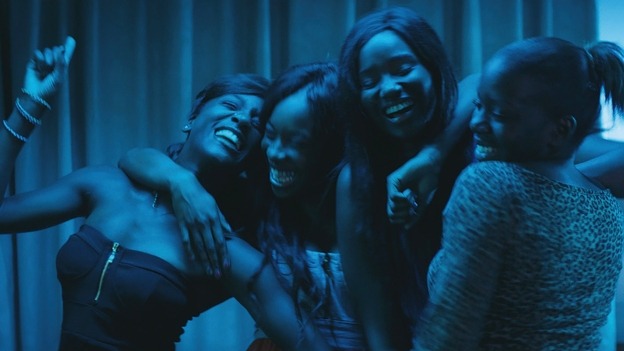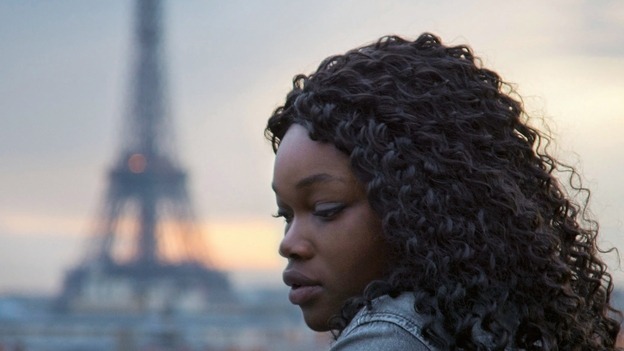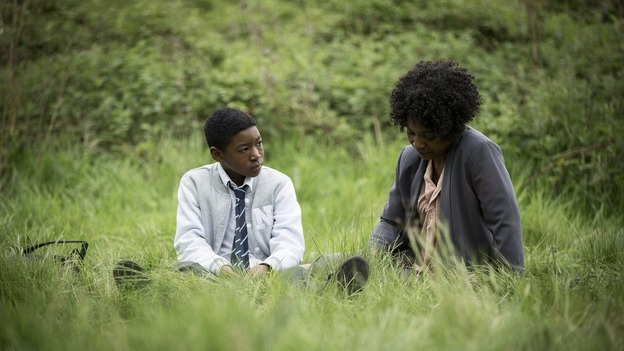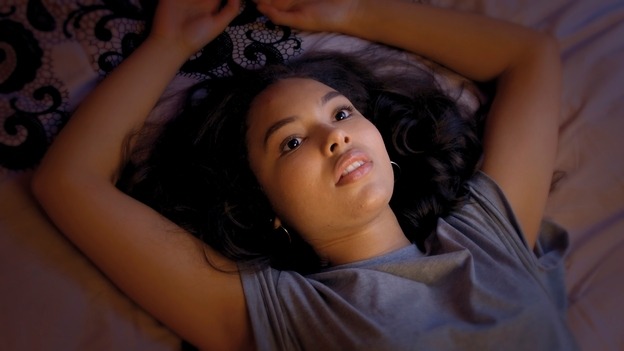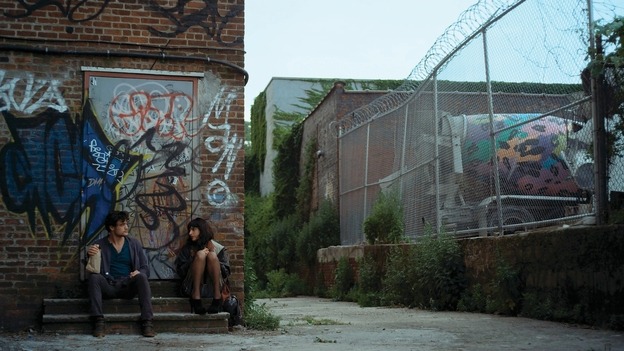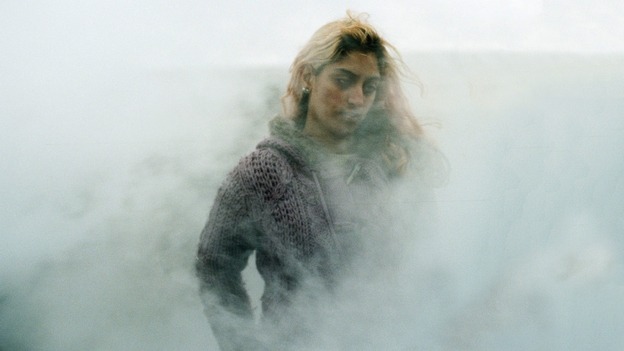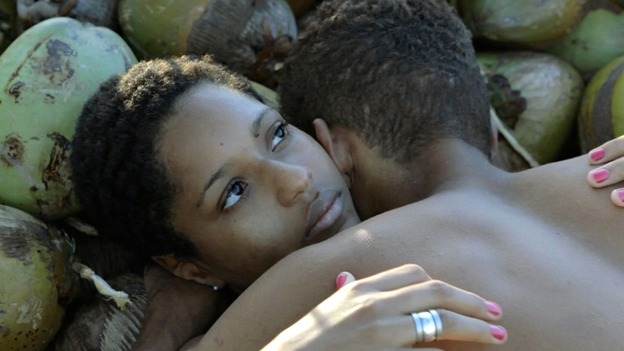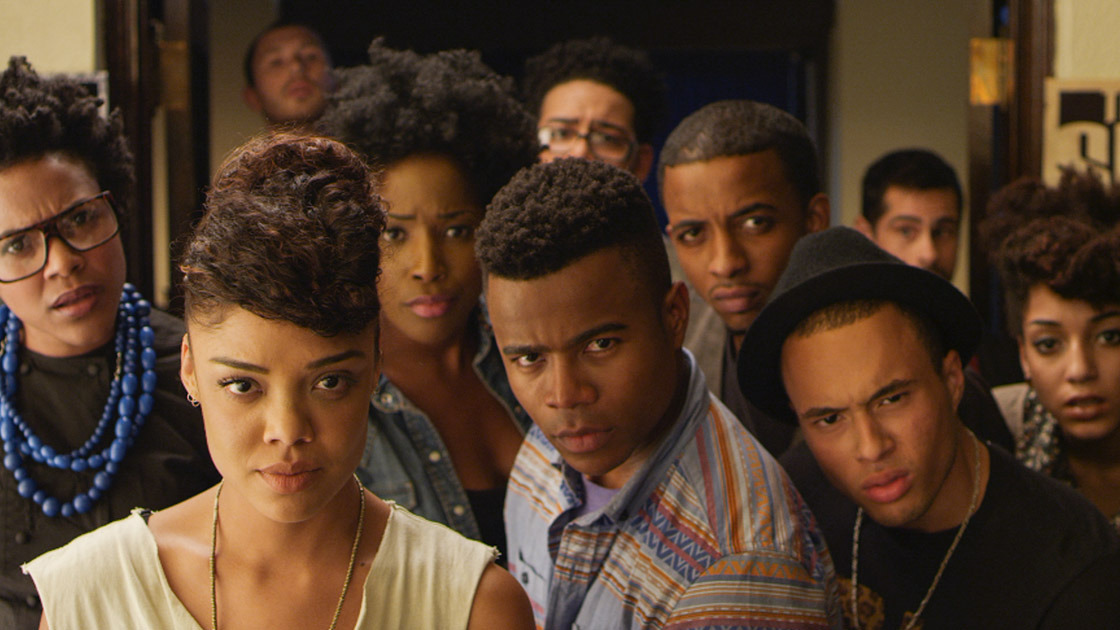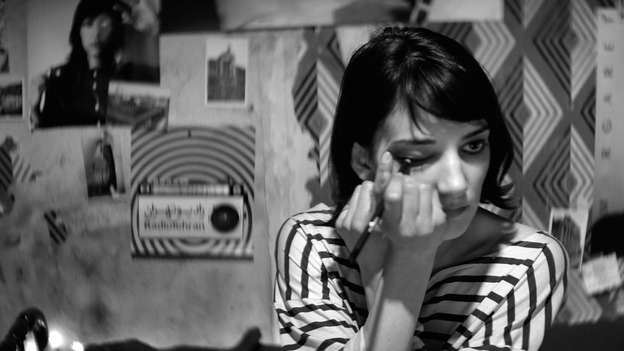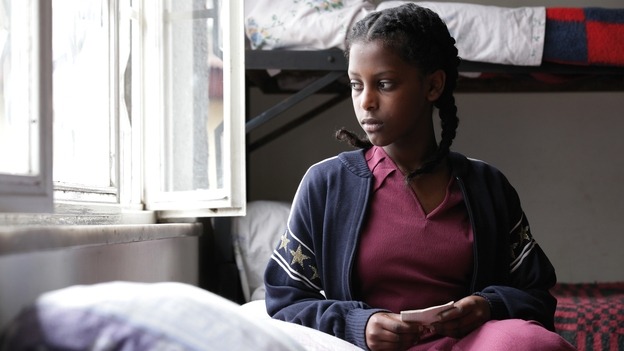The BFI London Film Festival is nearly here! I've gone through the programme to find all the films starring women of colour. There are admittedly a lot more than I was expecting including Girlhood, Honeytrap and the much anticipated Dear White People.
**NOTE: film titles listed below are clickable and will redirect you to the BFI site where you can buy tickets once on sale.
1. Girlhood
Céline Sciamma (Water Lilies, Tomboy) continues her exploration of the effects of social conventions on delicately forming female identities in her triumphant third film. Sixteen-year-old Marieme (Karidja Touré) must navigate not only the disruptive onset of womanhood, but also the inequalities of being black and living in the underprivileged suburbs of Paris. Excluded from school and in fear of her overbearing brother at home, Marieme escapes into the shielding environment of a girl gang. She renames herself ‘Vic’ for ‘Victory’ and gives up on asking for the things she wants and learns to just take them. Formally meticulous, the film is divided into four distinct segments in which Marieme changes her physical appearance to suit the different worlds she must navigate (school, home, street). Each transformation magnificently captures the heavy burden that visibility and image play in Marieme’s life, whilst Crystel Fournier’s stunning photography that favours a distinctive blue palette ensures that Marieme remains a defiantly vital presence on screen even while it appears she is disappearing from society’s view. The jubilant soundtrack infuses the film with vigour and passion, from the opening juddering electro-goth of Light Asylum’s ‘Dark Allies’ to a full length lip sync to Rhianna’s ‘Diamonds’. With Girlhood Sciamma flawlessly evokes the fragile resilience of youth.
Adapted from a story by Doris Lessing, My Friend Victoria is a complex, poignant portrait of two young black women in contemporary Paris. The film follows them from childhood into adulthood, with the older Fanny narrating the story of her friend and adoptive sister. Aged eight, Victoria spends a night in the home of a wealthy white family; years later, she encounters them again and her life is changed forever. As Fanny and Victoria’s destinies take them in separate directions, the drama offers a distinctly fresh take on racial identity in contemporary France – and on questions of class, privilege and blinkered liberal racism. Superbly acted by newcomers Guslagie Malanda and Nadia Moussa, along with veterans Mouchet and Greggory, My Friend Victoria sees Jean-Paul Civeyrac returning to the LFF after his poetic, elegant Young Girls in Black (2010). His follow-up is an acutely intelligent achievement by a director whose time has surely come.
It’s a bold move to make your debut theatrical feature a modern day take on such a big theological ‘What If?’, and Debbie Tucker Green astonishes with this London-set drama, where the newest family member is neither expected nor biologically possible. Jax (Marshall) works in the welfare office, lives with tube-worker husband (Elba), and their sensitive, nature-loving son JJ who, on the cusp of manhood is constantly looking around him for cues on how to make this transition. It’s rare to see a woman on-screen who remains so taciturn in the face of inner turmoil and as Jax’s self-possession begins to frustrate her friends and family, the film ramps up the tension with Nadine Marshall’s performance creating one of the most unshakable characters in recent memory. Taking the ‘kitchen sink’ tradition of social realism to a fresh new place, it’s a film that lingers, and marks Green as an immediate new voice in British cinema.
4. Honeytrap
Layla (Jessica Sula) is 15 and has been living in Trinidad. Returned to her estranged mother in Brixton, she is faced with settling into a new home and a new city with a fresh set of rules and codes. Unsupported by her mother and spitefully rejected by her female peers, she is drawn to the brooding Troy, who marks her as his ‘Trini princess’. When that fails, she takes solace in the friendship of Shaun, another admirer, but her desperate need for acceptance leads to a tragic betrayal of his kindness. Director Rebecca Johnson was inspired by real life cases and explores gang culture from a girl’s perspective. Moving beyond the headlines, Johnson gives us an intricately layered and rarely seen perspective – firmly located in the domain of a young girl becoming a woman in a hyper-masculine world. Sula’s performance here is flawless, perfectly capturing the agonising contradiction of Layla’s choice.
Shirin breaks up with Maxine, clutching only a strap-on dildo as she storms across Brooklyn. It’s hardly what polite society would deem appropriate behaviour – which is precisely what writer-director-star Desiree Akhavan sets out to challenge in her fearless feature debut. There isn’t an aspect of life that her protagonist, a twentysomething bisexual Iranian-American, can’t overcomplicate and sabotage, be it cultural, professional, sexual or emotional. Veering from desperate bed hopping to disastrous kindergarten moviemaking classes, Akhavan spares herself – and us – nothing of Shirin’s solipsistic neuroses. So it’s all the more impressive that her bracing honesty (‘You can’t keep playing the Persian card’ Maxine scolds) and deft, witty characterisations make for such engaging, empathetic company. The setting, subject and lack of inhibition virtually guarantee Lena Dunham (Girls) comparisons, but Akhavan’s ethnically and sexually specific search for identity onscreen marks out a topography and artistic voice very much her own.
On the run from her traditional Pakistani family, 17-year-old Laila, along with her boyfriend Aaron, has fled her home for the imposing landscapes of the Yorkshire Moors. As the couple attempt to forge an anonymous existence, unbeknownst to them two groups of men are on their trail, intent on catching up with the young lovers and exacting a brutal punishment at the orders of Laila’s father. Working with famed cinematographer Robbie Ryan (Fish Tank, The Angel’s Share), who captures the vast expanses of the Pennines to stunningly ominous effect, and boasting a devastating central performance by newcomer Sameena Jabeen Ahmed, Daniel and Matthew Wolfe’s hugely impressive debut is a complex and challenging piece of work. In many ways evocative of a British social realist take on John Ford’s The Searchers, with a near-noirish sense of pessimism and bleakness, the film’s observations on family dynamics, race and class are both brutally nihilistic and poetically affecting.
7. August Winds
The setting of this haunting debut feature from Gabriel Mascaro is a remote village on Brazil’s northeast coast. Shirley (Dandara de Morais), a young woman from the city, has moved there in order to look after her ageing grandmother. She starts dating Jeison (Geová Manoel dos Santos) and gains employment from a local farmer. Filming his actors and the landscape with an unhurried, watchful sensitivity that reflects his documentary background, Mascaro creates an atmospheric portrait of life in this remote community, in particular charting Shirley and Jeison’s heady romance with seductive sensuality. He also introduces a note of disquiet with the arrival of a researcher (played by the director himself) to record the sounds of the changing coastal winds. It also becomes apparent that the village is facing the devastating consequences of global warming. A melancholy and visually sumptuous reflection on a threatened way of life.
Trouble is brewing at prestigious Ivy League Winchester College. The sole black-only fraternity is to be diversified, to the disgust of firebrand campus DJ Sam White (caustic host of ‘Dear White People’). So when Sam accidentally becomes hall president and word spreads of a rival white college’s ‘African-American-themed party’, she and her fellow black students must reassess where they belong in an alleged ‘post-racial’ Obama nation. Whereas many films that tackle issues reduce their characters to mouthpieces, Justin Simien’s razor-sharp satire makes all his protagonists thrillingly nuanced and conflicted. Visually inventive (the fourth wall regularly takes a pummelling) yet controlled, it’s in the idea stakes that Simien really lets fly, nailing cultural preconceptions of all colours. Early Spike Lee comparisons – notable School Daze and Do The Right Thing – are inevitable and somewhat courted, but Simien passionately makes his own case for provocative, relevant filmmaking: we’ve gotta have it.
In the deadbeat Iranian ghost town of Bad City, a lone female vampire stalks the streets at night searching for prey. One of the town’s residents is Arash, who through a series of events involving his junkie father, a prostitute and a drug-dealing pimp, encounters the enigmatic bloodsucker and an unlikely love story begins to unfold. Plot may well be secondary to the striking visual language of Ana Lily Amirpour’s arresting debut; its deliberately enigmatic narrative allowing for a superbly ambitious exercise in style and atmosphere. With its stark black and white photography, A Girl Walks Home Alone at Night is in many ways evocative of the works of Jim Jarmusch, although ironically it bears the strongest resemblance to his early masterwork Stranger than Paradise than it does his own recent vampire film Only Lovers Left Alive. But while Amirpour’s influences are clear, in her effortless blending of multiple genres and monochromatic evocation of a matriarchal underworld, her voice as a singular and exciting new talent is undeniable. If you only see one Iranian vampire western this year, make sure it’s this one.
10. Difret (TW: Rape)
An affecting feature debut, Difret details the traumatic experience of an Ethiopian girl accused of killing a man who sexually abused her. On her way back home from school, 14-year-old Hirut (Tizita Hagere) is kidnapped by a gang of men and forced into marrying their leader Tadele. She is beaten and raped but manages to free herself, escaping with the rifle she uses to shoot her abductor. Arrested and charged with murder, local justice requires that Hirut is executed and then buried with her victim. However, on hearing about her case a courageous lawyer (Meron Getnet) decides to defend her – at great risk to her own career. Difret, which means ‘courage’ in Amharic, is a delicate yet impassioned story that offers empowerment and hope to countless women all over the world.
More films (not pictured): Beti and Amare, Self Made, War Book and Labour of Love.
Tickets go on sale at 10am on Thursday 18th September. You can see the full listing (and any films i've missed) as well as information about how to buy tickets on the BFI London FIlm Festival website.

